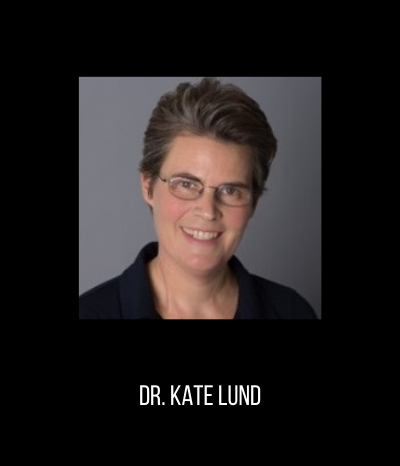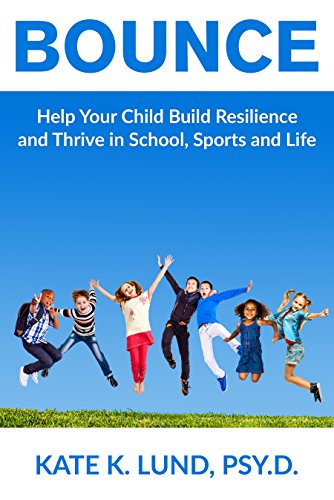Interview with Dr. Kate Lund

Dr. Kate Lund is a licensed clinical psychologist and performance coach with more than 15 years experience. An adjunct instructor in psychology at Bastyr University in Seattle, she has specialized training in medical psychology from three different hospitals all of which are affiliated with Harvard Medical School.
A renowned expert on the psychology of resilience, Dr. Lund writes and speaks on a variety of topics aimed at empowerment and the development of one's true potential and uses a strengths-based approach in working with students, athletes, parents, and teams to improve their mental game in school, sports and life while helping them to reach their full potential.
Q & A
You're known as an expert on the psychology of resilience, what led you to pursue an interest in this particular topic?
Well, it's a bit of a long story. My interest in resilience goes back to my childhood when I was growing up with a medical condition which meant lots of time in the hospital and out of school. In order to live fully, I had to bounce back from each setback and learn to focus on the things I could do as opposed to the things I could not do. I was fortunate in that I had lots of support from my family, friends and teachers so this helped me to focus more on finding ways to move through and beyond the challenges I faced.
Throughout my early years in school, I was always drawn to the social sciences and looked for opportunities to volunteer or be involved in ways which helped me learn about human behavior while helping those who were struggling. In college, I majored in psychology and found every opportunity I could to gain experience in the field. In my senior year, I worked in a local hospital and did research in health psychology and these experiences solidified my career path. In graduate school, I was lucky enough to find an opportunity to do an internship at a pediatric burn hospital working with children who had suffered catastrophic injuries. Helping these children and their families create a new sense of normal while also managing the reality of their injuries was a powerful experience and intensified my interest in the topic of resilience.
To summarize, my interest in resilience developed early and has evolved over time as I have worked with many children and families in moving through and beyond challenge in a way that allows them to embrace a new normal and maximize potential.
Whose work in the field of resilience research has influenced you the most?
When it comes to the research in the field of resilience, I have been most influenced over time by Martin Seligman's work on positive psychology and I also find myself drawn to the work Angela Duckworth has done on grit and perseverance.
You often talk about finding ordinary within the extraordinary in relation to your work on resilience. Could you briefly explain what you mean by this?
When I talk about finding ordinary within the extraordinary, I am highlighting the power in helping children or anyone for that matter to discover and define who they are at the core. Often, we see children defining themselves based on what happens to them or around them or based on what others say about them. What I am suggesting is that understanding ourselves from the inside out and allowing this to drive us towards our potential is vital for growth. We want to help our children focus on what they can do and not be defined by challenge or the hard things that happen. We want to teach our children lessons early which help them to embrace setbacks as opportunities and we want to help them embrace these ideas over time as they face the inevitable challenges life will throw at them.
As a licensed clinical psychologist you use a strengths-based approach to help your clients. What is a strengths-based approach?
A strengths-based approach is one which focuses on one's strengths and what he or she does well first and uses these things as a catalyst for making positive change or creating a new normal. Of course, we don't ignore the real challenges people face, we address those as well, yet leading with strengths is quite powerful.
What can readers expect from your book 'Bounce: Help Your Child Build Resilience and Thrive In School, Sports and Life'?
Bounce presents my vision of the seven pillars of resilience for children. This vision is based on my own early experiences, combined with years of clinical experience working with children and families facing a range of challenges and an extensive review of the literature. These seven pillars include:
- Tolerating frustration and managing emotions
- Navigating friendships and social pressures
- Sustaining focus and attention
- Developing courage
- Building motivation
- Finding confidence
- Creating optimism
The book is for parents, educators, coaches, community leaders and anyone with an active interest in helping children to become as resilient and realize their potential. My goal is to present the reasons that resilience is so important for children, while providing strategies in an actionable and accessible way for bolstering resilience in children.
Each of the seven pillars of resilience has its own chapter in which I go into detail and offer composite stories that illustrate real-life situations and challenges children face in school each day, as well as the types of strategies that can help them master these challenges. Each "pillar" chapter ends with a list of action steps which can be implemented right away to help children build resilience.
If you had to recommend just one effective strategy for helping children to build resilience, what would it be and why?
There are so many strategies to choose from - yet, if I had to pick one, I would say teach your child to manage emotions and tolerate frustration from a very early age. If we think about it, managing emotions and tolerating frustration is at the core of our ability to move through and beyond challenge without shutting down. This is vital in our ability to get back up and try again when things go off track. If we are shut down by our emotions and level of frustration, we are not going anywhere.
What advice would you give to someone hoping to pursue a career in clinical psychology?
I would recommend talking to many people about the field of psychology and taking opportunities to learn and gain experience in the field before, during and after the graduate school process. Making connections and building on those connections is a vital in building a career as a psychologist.
What projects are you working on at the moment?
My most recent project is a video course and companion workbook for parents on helping elementary age children to build resilience and thrive in school, sports and life. The course is very closely aligned with my book on the same topic. Yet, the video course is more in depth and provides an opportunity for parents and coaches to personalize the material to their own situation in a way that makes the most sense to them. This makes the tools and strategies for building resilience that much more powerful.
Connect With Dr. Kate Lund
Connect With Dr. Kate Lund on LinkedIn
Go Back To The Psychology Expert Interviews Page
